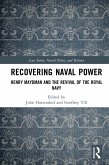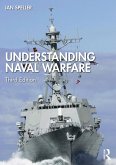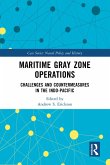Howard J. Fuller
Empire, Technology and Seapower (eBook, ePUB)
Royal Navy crisis in the age of Palmerston
44,95 €
44,95 €
inkl. MwSt.
Sofort per Download lieferbar

22 °P sammeln
44,95 €
Als Download kaufen

44,95 €
inkl. MwSt.
Sofort per Download lieferbar

22 °P sammeln
Jetzt verschenken
Alle Infos zum eBook verschenken
44,95 €
inkl. MwSt.
Sofort per Download lieferbar
Alle Infos zum eBook verschenken

22 °P sammeln
Howard J. Fuller
Empire, Technology and Seapower (eBook, ePUB)
Royal Navy crisis in the age of Palmerston
- Format: ePub
- Merkliste
- Auf die Merkliste
- Bewerten Bewerten
- Teilen
- Produkt teilen
- Produkterinnerung
- Produkterinnerung

Bitte loggen Sie sich zunächst in Ihr Kundenkonto ein oder registrieren Sie sich bei
bücher.de, um das eBook-Abo tolino select nutzen zu können.
Hier können Sie sich einloggen
Hier können Sie sich einloggen
Sie sind bereits eingeloggt. Klicken Sie auf 2. tolino select Abo, um fortzufahren.

Bitte loggen Sie sich zunächst in Ihr Kundenkonto ein oder registrieren Sie sich bei bücher.de, um das eBook-Abo tolino select nutzen zu können.
This book examines British naval diplomacy from the end of the Crimean War to the American Civil War, showing how the mid-Victorian Royal Navy suffered serious challenges during the period.
- Geräte: eReader
- mit Kopierschutz
- eBook Hilfe
- Größe: 2.29MB
Andere Kunden interessierten sich auch für
![Empire, Technology and Seapower (eBook, PDF) Empire, Technology and Seapower (eBook, PDF)]() Howard J. FullerEmpire, Technology and Seapower (eBook, PDF)44,95 €
Howard J. FullerEmpire, Technology and Seapower (eBook, PDF)44,95 €![From East of Suez to the Eastern Atlantic (eBook, ePUB) From East of Suez to the Eastern Atlantic (eBook, ePUB)]() Edward HampshireFrom East of Suez to the Eastern Atlantic (eBook, ePUB)53,95 €
Edward HampshireFrom East of Suez to the Eastern Atlantic (eBook, ePUB)53,95 €![Navies in Multipolar Worlds (eBook, ePUB) Navies in Multipolar Worlds (eBook, ePUB)]() Navies in Multipolar Worlds (eBook, ePUB)43,95 €
Navies in Multipolar Worlds (eBook, ePUB)43,95 €![Architects of Continental Seapower (eBook, ePUB) Architects of Continental Seapower (eBook, ePUB)]() Jeremy StockerArchitects of Continental Seapower (eBook, ePUB)43,95 €
Jeremy StockerArchitects of Continental Seapower (eBook, ePUB)43,95 €![Recovering Naval Power (eBook, ePUB) Recovering Naval Power (eBook, ePUB)]() Recovering Naval Power (eBook, ePUB)42,95 €
Recovering Naval Power (eBook, ePUB)42,95 €![Understanding Naval Warfare (eBook, ePUB) Understanding Naval Warfare (eBook, ePUB)]() Ian SpellerUnderstanding Naval Warfare (eBook, ePUB)41,95 €
Ian SpellerUnderstanding Naval Warfare (eBook, ePUB)41,95 €![Maritime Gray Zone Operations (eBook, ePUB) Maritime Gray Zone Operations (eBook, ePUB)]() Maritime Gray Zone Operations (eBook, ePUB)42,95 €
Maritime Gray Zone Operations (eBook, ePUB)42,95 €-
-
-
This book examines British naval diplomacy from the end of the Crimean War to the American Civil War, showing how the mid-Victorian Royal Navy suffered serious challenges during the period.
Dieser Download kann aus rechtlichen Gründen nur mit Rechnungsadresse in A, B, BG, CY, CZ, D, DK, EW, E, FIN, F, GR, HR, H, IRL, I, LT, L, LR, M, NL, PL, P, R, S, SLO, SK ausgeliefert werden.
Produktdetails
- Produktdetails
- Verlag: Taylor & Francis eBooks
- Seitenzahl: 320
- Erscheinungstermin: 3. Januar 2014
- Englisch
- ISBN-13: 9781134200443
- Artikelnr.: 40301104
- Verlag: Taylor & Francis eBooks
- Seitenzahl: 320
- Erscheinungstermin: 3. Januar 2014
- Englisch
- ISBN-13: 9781134200443
- Artikelnr.: 40301104
- Herstellerkennzeichnung Die Herstellerinformationen sind derzeit nicht verfügbar.
Howard J. Fuller is Senior Lecturer of War Studies at the University of Wolverhampton (UK), Associate Editor for the International Journal of Naval History and the author of Clad in Iron: The American Civil War and the Challenge of British Naval Power (2007).
Introduction Part I: Palmerstonian 'Gunboat Diplomacy', Ironclad Technology
and the 'Declinist' Controversy 1: The edge of naval defence 2: British
decline 3: Peace-making 4: 'Rule Britannia' 5: True, because it did not
happen 6: Breastworks 7: Monitors for coastal assault 8: 'Shock and Awe'
Part II: From the Crimean War to the American Civil War: Naval Innovation
and the Anglo-French Balance of Power 9: "Naval architecture, to a great
extent, must remain sheer empiricism" 10: "It is impossible now for this
country to rely entirely for its defence upon its naval means" 11: "The
British Lion must put his tail between his legs, and 'Civis Romanus' give
up swaggering so loftily" 12: "They may hope for a fair share of success in
at least the outbreak of hostilities" 13: "To increase his naval means,
evidently for offensive as well as for defensive Purposes" 14: "If by a
Stroke of the wand I could effect in the Map of the world the Changes which
I could wish" 15: "The policy of substituting ships protected by heavy iron
plates need not enter into the consideration" 16: "We are too rich, too
industrious, too dependent on other nations, to face indifferently the
prospect of a blockade" 17: "We have found a way of making men-of-war shot
proof" 18: "Give us in the shortest Time good means of Defence at Home" 19
: "The means by which we shall again be able to catch the bird in his own
net" 20: "Not as the wisest, nor as the most economical, nor as the safest
way of meeting the exigencies of the case" Part III: 'Splendid Isolation',
the 'Cherbourg Strategy' and the 'Great Armament' Reconsidered 21:
'Splendid Isolation': a matter of choice?' 22: Cherbourg 23: Cronstadt 24:
The 'Great Armament' 25: The edge of naval offence 26: 'twixt sea and shore
Part IV: Iron Lion or Paper Tiger? The Myth of British Naval Intervention
in the American Civil War 27: "The dissolution of the Union will prove good
to the world, to Great Britain, and probably in the end to America herself"
28: "We shall soon iron the smile out of their face" 29: "Is the Warrior
itself a match for the Monitor? It is useless now to talk of speed and
magnificence" 30: "The peril of committing the honour of this country to
the assumption of an attitude, which it may be unable or unwilling
permanently to maintain" Conclusion
and the 'Declinist' Controversy 1: The edge of naval defence 2: British
decline 3: Peace-making 4: 'Rule Britannia' 5: True, because it did not
happen 6: Breastworks 7: Monitors for coastal assault 8: 'Shock and Awe'
Part II: From the Crimean War to the American Civil War: Naval Innovation
and the Anglo-French Balance of Power 9: "Naval architecture, to a great
extent, must remain sheer empiricism" 10: "It is impossible now for this
country to rely entirely for its defence upon its naval means" 11: "The
British Lion must put his tail between his legs, and 'Civis Romanus' give
up swaggering so loftily" 12: "They may hope for a fair share of success in
at least the outbreak of hostilities" 13: "To increase his naval means,
evidently for offensive as well as for defensive Purposes" 14: "If by a
Stroke of the wand I could effect in the Map of the world the Changes which
I could wish" 15: "The policy of substituting ships protected by heavy iron
plates need not enter into the consideration" 16: "We are too rich, too
industrious, too dependent on other nations, to face indifferently the
prospect of a blockade" 17: "We have found a way of making men-of-war shot
proof" 18: "Give us in the shortest Time good means of Defence at Home" 19
: "The means by which we shall again be able to catch the bird in his own
net" 20: "Not as the wisest, nor as the most economical, nor as the safest
way of meeting the exigencies of the case" Part III: 'Splendid Isolation',
the 'Cherbourg Strategy' and the 'Great Armament' Reconsidered 21:
'Splendid Isolation': a matter of choice?' 22: Cherbourg 23: Cronstadt 24:
The 'Great Armament' 25: The edge of naval offence 26: 'twixt sea and shore
Part IV: Iron Lion or Paper Tiger? The Myth of British Naval Intervention
in the American Civil War 27: "The dissolution of the Union will prove good
to the world, to Great Britain, and probably in the end to America herself"
28: "We shall soon iron the smile out of their face" 29: "Is the Warrior
itself a match for the Monitor? It is useless now to talk of speed and
magnificence" 30: "The peril of committing the honour of this country to
the assumption of an attitude, which it may be unable or unwilling
permanently to maintain" Conclusion
Introduction Part I: Palmerstonian 'Gunboat Diplomacy', Ironclad Technology
and the 'Declinist' Controversy 1: The edge of naval defence 2: British
decline 3: Peace-making 4: 'Rule Britannia' 5: True, because it did not
happen 6: Breastworks 7: Monitors for coastal assault 8: 'Shock and Awe'
Part II: From the Crimean War to the American Civil War: Naval Innovation
and the Anglo-French Balance of Power 9: "Naval architecture, to a great
extent, must remain sheer empiricism" 10: "It is impossible now for this
country to rely entirely for its defence upon its naval means" 11: "The
British Lion must put his tail between his legs, and 'Civis Romanus' give
up swaggering so loftily" 12: "They may hope for a fair share of success in
at least the outbreak of hostilities" 13: "To increase his naval means,
evidently for offensive as well as for defensive Purposes" 14: "If by a
Stroke of the wand I could effect in the Map of the world the Changes which
I could wish" 15: "The policy of substituting ships protected by heavy iron
plates need not enter into the consideration" 16: "We are too rich, too
industrious, too dependent on other nations, to face indifferently the
prospect of a blockade" 17: "We have found a way of making men-of-war shot
proof" 18: "Give us in the shortest Time good means of Defence at Home" 19
: "The means by which we shall again be able to catch the bird in his own
net" 20: "Not as the wisest, nor as the most economical, nor as the safest
way of meeting the exigencies of the case" Part III: 'Splendid Isolation',
the 'Cherbourg Strategy' and the 'Great Armament' Reconsidered 21:
'Splendid Isolation': a matter of choice?' 22: Cherbourg 23: Cronstadt 24:
The 'Great Armament' 25: The edge of naval offence 26: 'twixt sea and shore
Part IV: Iron Lion or Paper Tiger? The Myth of British Naval Intervention
in the American Civil War 27: "The dissolution of the Union will prove good
to the world, to Great Britain, and probably in the end to America herself"
28: "We shall soon iron the smile out of their face" 29: "Is the Warrior
itself a match for the Monitor? It is useless now to talk of speed and
magnificence" 30: "The peril of committing the honour of this country to
the assumption of an attitude, which it may be unable or unwilling
permanently to maintain" Conclusion
and the 'Declinist' Controversy 1: The edge of naval defence 2: British
decline 3: Peace-making 4: 'Rule Britannia' 5: True, because it did not
happen 6: Breastworks 7: Monitors for coastal assault 8: 'Shock and Awe'
Part II: From the Crimean War to the American Civil War: Naval Innovation
and the Anglo-French Balance of Power 9: "Naval architecture, to a great
extent, must remain sheer empiricism" 10: "It is impossible now for this
country to rely entirely for its defence upon its naval means" 11: "The
British Lion must put his tail between his legs, and 'Civis Romanus' give
up swaggering so loftily" 12: "They may hope for a fair share of success in
at least the outbreak of hostilities" 13: "To increase his naval means,
evidently for offensive as well as for defensive Purposes" 14: "If by a
Stroke of the wand I could effect in the Map of the world the Changes which
I could wish" 15: "The policy of substituting ships protected by heavy iron
plates need not enter into the consideration" 16: "We are too rich, too
industrious, too dependent on other nations, to face indifferently the
prospect of a blockade" 17: "We have found a way of making men-of-war shot
proof" 18: "Give us in the shortest Time good means of Defence at Home" 19
: "The means by which we shall again be able to catch the bird in his own
net" 20: "Not as the wisest, nor as the most economical, nor as the safest
way of meeting the exigencies of the case" Part III: 'Splendid Isolation',
the 'Cherbourg Strategy' and the 'Great Armament' Reconsidered 21:
'Splendid Isolation': a matter of choice?' 22: Cherbourg 23: Cronstadt 24:
The 'Great Armament' 25: The edge of naval offence 26: 'twixt sea and shore
Part IV: Iron Lion or Paper Tiger? The Myth of British Naval Intervention
in the American Civil War 27: "The dissolution of the Union will prove good
to the world, to Great Britain, and probably in the end to America herself"
28: "We shall soon iron the smile out of their face" 29: "Is the Warrior
itself a match for the Monitor? It is useless now to talk of speed and
magnificence" 30: "The peril of committing the honour of this country to
the assumption of an attitude, which it may be unable or unwilling
permanently to maintain" Conclusion







